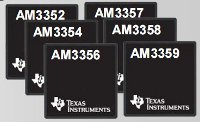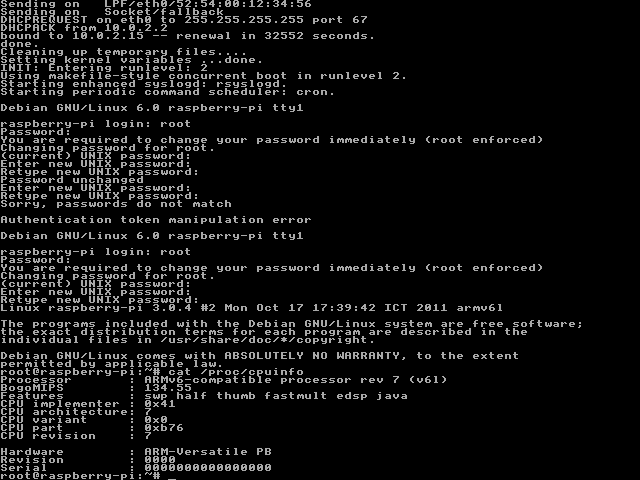BTRFS (B-tree file system) is a GPL copy-on-write file system for Linux developed by Oracle and is expected to replace ext4 as the default file system in future Linux distributions. Here are the main features of BRTFS (pronounced like Better FS): Extend file system (264 max file size: 16 Exabytes) Copy on write (COW) data and meta-data Space efficient packaging of small file Optional transparency compression (zlib/LZO) Integrity checksumming (CRC-32C) for data and meta-data Writable snapshots Subvolumes Online resize, defragmentation, device management Multiple device support (pool of storage) Offline conversion from ext3 and ext4 Specialized log for fast sync and O_SYNC writes BTRFS is included in the Linux kernel (since Linux 2.6.29) and can be enabled during installation of several distributions such as Fedora 15 and Ubuntu 10.10, but is not officially the default file system just yet. To learn more about the internal of BTRFS you can watch the […]
TI Unveils Sitara AM335x ARM Series Cortex-A8 Processors
Texas Instruments has just announced the new Sitara AM335X Processors and the low cost Beaglebone development board. The low cost Cortex-A8 SoCs start at 5 US dollars per piece and are aimed at upgrading ARM9 solutions (software compatible) and adding new features such as 3D interfaces and touch screen, high resolution displays with faster performance. Texas Instruments says you could take those new upgraded products to market within 6 months thanks to their inexpensive development board (Beaglebone) and complete SDK. There are six models in the Sitara AM335X series: AM3552: Cortex A8 up to 720 MHz. AM3554: Cortex A8 up to 720 MHz with 3D Graphics (PowerVR SGX GPU). AM3556: Cortex A8 up to 720 MHz with programmable real-time unit (PRU) @ 200 Mhz. AM3557: Cortex A8 up to 720 MHz with PRU @ 200Mhz and EtherCat. AM3558: Cortex A8 up to 720 MHz with 3D Graphics and PRU @ […]
Yocto Project Release 1.1 Announced
The Linux foundation announced Yocto Project Release 1.1 today. This release codenamed “Edison” and based on Poky 6.0 is the the second release of the project, one year after it was announced in October 2010 to provide developers with greater consistency in the software and tools they’re using across multiple architectures for embedded Linux development. The Yocto Project reached the following milestones during the last year: Alignment of OpenEmbedded technology and the inclusion of OpenEmbedded representation in the Yocto Project governance structure. The projects share a common core that consists of software build recipes and core Linux components that prevent fragmentation and reinforce the OpenEmbedded methodology as an open standard for embedded Linux build systems. Contribution of tools and technologies such as Cross-prelink, EGLIBC, Pseudo, Shoeleather Lab (for automated testing) and Swabber have been contributed from Intel, Mentor Graphics, MontaVista Software and Wind River. Commercial adoption with examples such as […]
Linux 3.1 Release
Linux Torvalds announced the release of Linux Kernel 3.1 yesterday: As promised, the kernel summit has started, and Linux-3.1 is out. The (small) shortlog of changes since -rc10 are appended, we have mostly some sparc and networking changes, along with some radeon and intel iommu fixes (mostly for largepages and integrated graphics issues). Most people probably will not notice the changes. One big change from -rc10 is that there are tar-balls and patches, so if you aren’t a git user (why?) you can download it now in a traditional format. On of the things to note is that the files are now signed by my gpg key, and it’s the *uncompressed* version that the signature is for. And of course, this means that the merge window for 3.2 is open. I’ll do some merging during the KS, but probably most when I get back home – but you can still […]
ARM big.LITTLE Processing Demo
ARM uploaded a big.LITTLE demonstration by Nandan Nayampally, Director, Product Marketing. The demo runs the Android 2.3 (Gingerbread) with graphs showing CPU usage and when Cortex A7 / A15 is running. At the beginning Cortex A7 handles the background tasks, and when they start the Android Browser, Cortex A15 is used instead to render the page and once this is done, the system switches back to Cortex A7. Scrolling the webpage will increase CPU usage, but this will still be handled by Cortex A7. They did not have to do any modifications to Android, but they just added a big.LITTLE aware Power Management Driver which will be open sourced and integrated in future version of the linaro kernel. Jean-Luc Aufranc (CNXSoft)Jean-Luc started CNX Software in 2010 as a part-time endeavor, before quitting his job as a software engineering manager, and starting to write daily news, and reviews full time later […]
Using Raspberry Pi as an Internet Kiosk
Following up on this morning post explaining how to get the kernel and minimal rootfs to run debian in qemu emulating an ARM1176 processor, I’ll show how to make a minimal rootfs to run Chrome browser in this platform. I tested it in QEMU, but this should also run on the Raspberry Pi hardware. First, you’ll have to complete the step I provided in Raspberry Pi Emulator in Ubuntu with Qemu. Start qemu: sudo qemu-system-arm -M versatilepb -cpu arm1176 -m 256 -hda rootfs.ext2 -kernel zImage -append “root=/dev/sda” -serial stdio Once you login to the console as root, create a new user (e.g guest): adduser guest This user will be needed to login with the graphical interface and ssh. In order to get an Internet Kiosk, we’ll need a web browser (Chromium) and a window manger. I chose fluxbox instead of gnome because of the size difference (8651 KB vs 1739 […]
Raspberry Pi Emulator in Ubuntu with Qemu
The Raspberry Pi board is a low cost board based on Broadcom BCM2835 media processor SoC with an ARM1176JZF-S core clocked at 700MHz. This board is currently under development and should be ready by end of November, beginning of December and will be sold for 25 USD (128MB RAM – no Ethernet) and 35 USD (256MB RAM – Ethernet). While we are waiting for the board, we can still test software using qemu to emulate a board based on an ARM1176 core with 128MB or 256 MB memory. I’ve tried to create a rootfs based on Ubuntu with rootstock but this only support processors with ARM cortex A8 and greater, so it would not work with ARM11. I’ll be using Debian Squeeze instead. Prerequisites My host computer is running Ubuntu 10.04.3 LTS, but any recent Ubuntu or Debian installation should work with these instructions. [Update: You won’t be able to […]
Linaro 11.09 Release with Linux Kernel 3.0.4
Linaro has just released version 11.09 based on Linux Kernel 3.0.4. Here are the highlights of the release: Android Ethernet Configuration Manager from the x86 Android project is now available in all builds. Ethernet now works on Panda, Staging Panda, Beagle, Beagle xM, Staging Snowball. QA on all boards for the 11.09 Linaro Android Builds. Daily builds of Android toolchain against gcc-linaro bzr repository is provided. Android is now compiled with GCC4.6 with -O3. Busybox is built from source in all Android builds. glmark2 added to all the official builds for Android. Powertop is now available on Android. Linaro’s 11.09 toolchain has been benchmarked. All Android builds are running with the 11.09 toolchain. The MLO that Panda and Staging Panda uses for Android uses gets built from source from the upstream git. An OMAP4460 Android build is available from android-build. Panda supports Bluetooth. Panda supports Wi-Fi. Snowball Android A-release from […]








